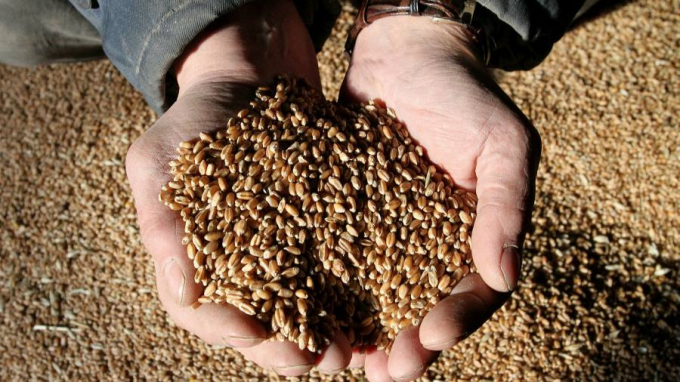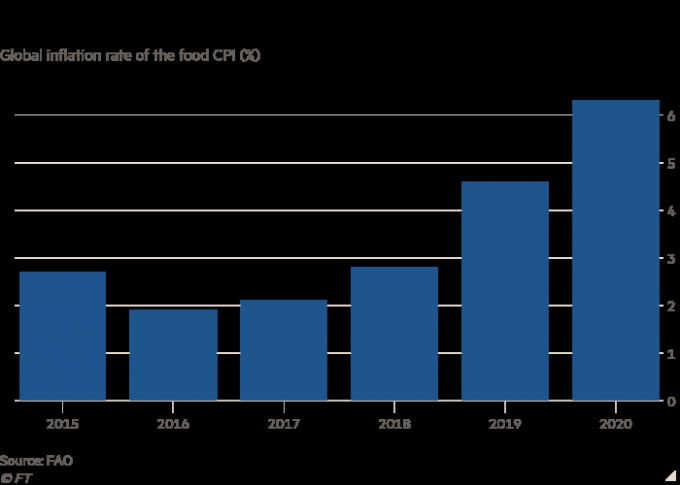November 27, 2025 | 11:22 GMT +7
November 27, 2025 | 11:22 GMT +7
Hotline: 0913.378.918
November 27, 2025 | 11:22 GMT +7
Hotline: 0913.378.918

The year-on-year leap in UN Food and Agriculture Organization’s monthly food price index was the largest since 2011 and signalled that inflation initially stoked by pandemic disruption is accelerating.
China’s soaring appetite for grain and soyabeans is adding to upward pressure on prices, along with a severe drought in Brazil and growing demand for vegetable oil for biodiesel.
The index is a key benchmark for internationally traded agricultural commodities and the increase brings it to its highest level since September 2011.
The rise in world market prices will further increase food price inflation especially among poorer countries reliant on imports for staples.
In 2020, the world’s consumer price inflation for food jumped to 6.3 per cent, up from 4.6 per cent in 2019, according to the FAO.
The pandemic disrupted food supply chains, affecting the production and distribution of food, with South Asia, sub-Saharan Africa and Latin America among the most affected regions.
The bad weather in Brazil, a big exporter of corn and soyabeans, and rising demand for soyabean oil for biodiesel have pushed prices higher, said analysts.

“China has continued to buy, but with Brazil’s drought proving to be more severe than expected, everyone has to pray that the weather in the US is going to be good,” said Abdolreza Abbassian, senior economist at the FAO.
Countries that depend on overseas producers for their staples have been hit by higher global food prices. The issue has become a political concern in some developing countries such as Ethiopia and Nigeria.
Some exporting countries have introduced an export tariff, such as Russia for its wheat sales, while others such as Argentina are discussing a controversial ban on beef exports.
In developed countries, the cost of raw ingredients accounts for only part of the overall price paid for products at the supermarket or in restaurants.
But the surge in commodity prices is leading to higher food prices, with companies such as Nestlé and Coca-Cola announcing they will pass on the price increases.
The opening of restaurants as lockdowns ease will add to the food bill, said Abbassian. “The decline in eating out wasn’t totally compensated with eating at home, but as people start to go to restaurants again, you will see food prices rise,” he said.
(Finacial Times)

(VAN) As floodwaters recede, a vast network of irrigation works across eastern Gia Lai is emerging in a state of severe disrepair, with extensive damage demanding urgent restoration ahead of the 2025-2026 winter-spring cropping season.

(VAN) The conference reviewing three years of implementing Decision 911 identified the need to prioritize improving marine environmental quality and promoting sustainable fisheries development.

(VAN) Le Hoai Trung, Member of the Communist Party of Viet Nam Central Committee and Minister of Foreign Affairs, held talks with Vi Thao, Chairman of the Guangxi Zhuang Autonomous Region (China) this week.

(VAN) The Mekong River Commission adopts the 2026 - 2030 Strategic Plan with a people-centered approach.
/2025/11/26/1720-1-200855_132.jpg)
(VAN) Viet Nam and Japan have many conditions to expand cooperation on climate change adaptation, particularly in disaster risk management based on advanced technologies.

(VAN) The strong development of digital technology and artificial intelligence is opening up opportunities to transform science and technology into a 'Magic eye' for disaster forecasting and early warning.

Applying vaccines and proactive disease prevention helps pig herds stay healthy, maintain productivity, reduce risks, and decrease reliance on antibiotics in modern livestock farming.